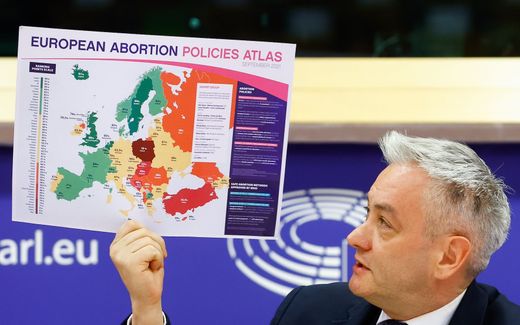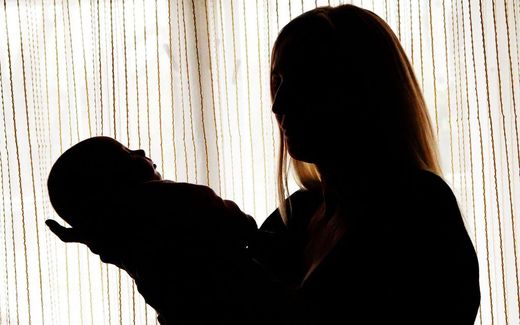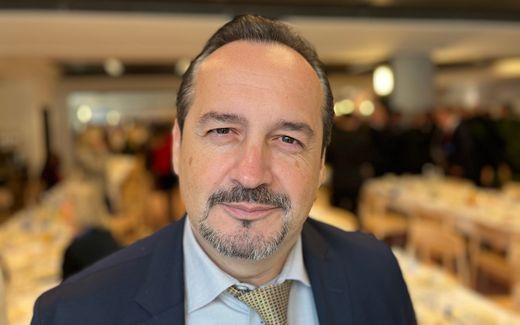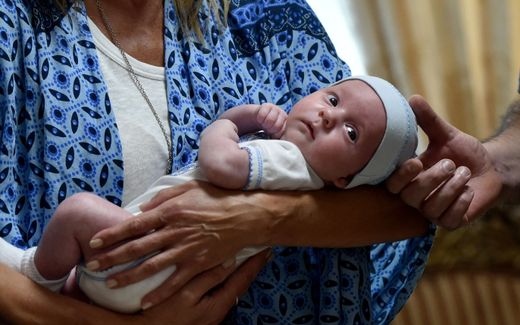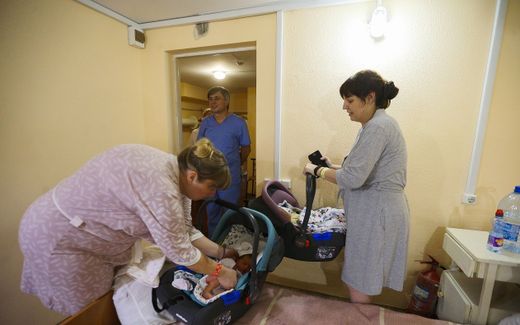Katy Faust: Children are harmed by relational experiments of adults
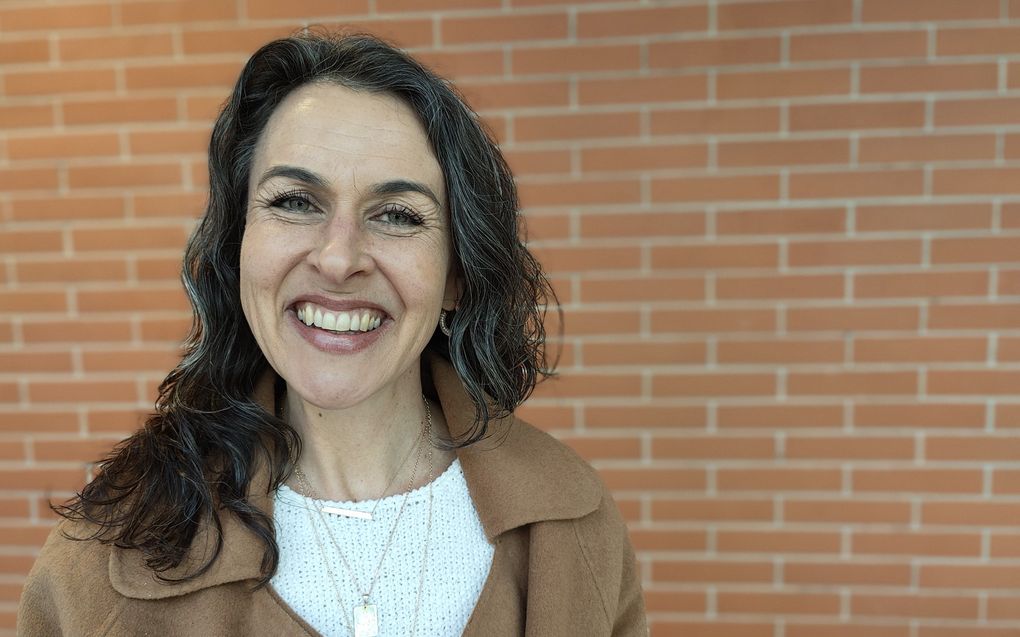
“You generally see reproductive technologies and the overhaul of marriage hand-in-hand”, says Faust. Photo CNE.news
European Union
Children’s rights advocate Katy Faust sees children suffer. Reproductive technologies and open marriages make them a victims of adult desires. “All this objectification of children is fundamentally an affront to God.”
“So, who is Lennart?” When you interview Katy Faust, the roles are reversed at first. On the sidelines of the Casablanca Conference in Rome, aimed at the abolition of surrogacy, the children’s rights advocate first wants to know what the journalist’s spouse looks like. “I just love everyone I talk to, and I want to know as much as possible about them”, she says. “Except for the people who victimise children. Those are the ones that I’m going to come after.”
The 48-year-old has been doing just that for over a decade. First as a blogger and since 2018 as the founder and president of the non-profit children’s rights organisation Them Before Us. This organisation is critical towards reproductive technologies and emphasises the need for children to grow up with a father and mother.
Dining room
Since launching her non-profit, Faust, a self-proclaimed “Bible-thumping Baptist”, has become a prominent voice in debates on marriage and family matters worldwide. But it is not a one-woman show, she stresses. “It is wonderful to have staff and donors come in to make up for my lack: to make things actionable. If I did this alone, I would have good conversations, but the message would not leave my dining room.”
Good conversation is something she is indeed capable of. While the children’s rights advocate makes her point clearly, without any empty words, she also effortlessly mentions her work −two books, one on children’s rights and one on raising kids in a woke environment− and that of her organisation. Despite this rhetorical strength, however, she did not plan for a life in the public debate. Actually, she was pushed into that.
Years before Faust founded Them Before Us, she raised her kids with her pastor husband in Seattle. When, in 2012, gay marriage became a major topic of debate in the United States, Faust launched askthebigot.com. In this anonymous blog, she would argue for traditional marriage and “give direction to the church on how to act Biblically on this subject.”
In 2014, however, members of Faust’s church got doxed. A gay blogger identified her and started harassing people from her church. It caused her coming out, but it did not stop her. In 2018, she launched Them Before Us, specifically aimed at children’s rights. “There are pro-life organisations, people fighting against transitioning children, and groups advocating for educational reform. But nobody was representing children in matters of marriage and family and standing up for their rights.”
Natural law
But what are these rights? According to Faust, they all boil down to natural law. “We are now tinkering with childhood in ways we never have before. That means we must articulate specific child rights that previous generations never considered.” According to Faust, children have a right to life and a right to a mother and father. “That is something we did not have to defend 50 years ago.”
For Faust herself, the right to a mother and father is personal. Her parents divorced when she was 10, after which she grew up with her mother and her lesbian friend. “I love them”, Faust says. “But they did acknowledge that I needed a father and gave me access to him after the divorce.”

However, not every child is so lucky. “There is a massive cost for children telling the truth about how they were harmed in situations of divorce or how they were created through reproductive technologies”, says Faust. “We have people aged sixty who share their testimony anonymously on our website because they are still trying to make their stepmom happy.”
Faust says that collecting stories is one of the most valuable things Them Before Us does. Her non-profit catalogues stories of children who were raised without a mother or father or who were created through surrogacy or donor-conceived. According to Faust, the marriage debate in the US was partly lost because the opponents of gay marriage focused too much on statistics. “The reality is that none of that holds a candle to the persuasive power of story”, she writes on her blog. “The right way to fight for marriage and children is to use storytelling to highlight the true victims.”
Them Before Us does not have any empirical data on the effects of these stories. But, Faust says, the traditional family advocates lose every battle. “That is because the people who want to redefine the family humanise their victims. You do not fight for a statistic, but you fight for a specific child. And that is what stories do: they give you someone to fight for.”
Global takeover
Faust’s fight is ambitious: she intends a “global takeover” and is sure she will get it. “Either we have a global takeover, and we defend the rights of children, or not only will our societies cease to function, but they may also cease to exist.”
She measures her success in two ways: changing hearts and changing laws. “Very few politicians are willing to risk their electoral prospects on a child that will not be able to vote for them for 18 years or 20 years. The ordinary mom and dad are probably the best hope we have of turning things around by understanding children’s rights.”
As an example, Faust mentions Latvia. “Our book has been translated into five different languages. One was Latvian because one mother translated the book after she put the children to bed”, she says. “As a result, Latvia now has a massive foundation to reject efforts to redefine the family.”
Uphill battle
Changing laws, on the other hand, is more difficult. “It is an uphill battle”, Faust says. “We are working against some of the most well-organised and well-moneyed international interests.”
However, in some countries, this work pays off. In Albania, activists tried to change ‘mother’ and ‘father’ on the birth certificate to ‘parent 1’ and ‘parent 2’ to legalise adoption for same-sex couples. Faust: “We were able to speak with some local pastors and imams and say: don’t talk about this as a sinful issue but as a matter of child protection. Talk about what happens when you normalise unrelated adults living with children.”
A national conference was organised with Orthodox, Evangelical and Muslim leaders shortly after. Along with Faust, the president of Albania was also one of the speakers. “The conference was published on three major national news stations, and within a week, activists in the country dropped all their efforts to redefine the family.”
Divorce
Worldwide, traditional marriage is under pressure, sees Faust. And that concerns her. “No-fault divorce was the original redefinition of marriage. It communicated that marriage is a relationship centred around the happiness of adults. So if the involved adults cease to be happy, it could cease to be a marriage.”
According to the children’s rights advocate, this redefinition transformed “what used to be the most child-friendly institution the world has ever known into just a vehicle of adult fulfilment.”
Children are a common thread running through Faust’s life. She now defends children’s rights and previously worked at one of the largest Chinese adoption agencies in the world, located in the US. That the subject is close to her heart is palpable during the interview; while passionately making her point, Faust regularly shifts to the edge of her seat when she wants to make a point. “Someone is going to do the hard thing. We think it should be the adults.”
With the devaluation of marriage, an increasing number of countries are liberalising their institution of marriage and opening it up for LGBT people. It makes Faust fearful of what will happen to the children. “You generally see reproductive technologies and the overhaul of marriage hand-in-hand”, she says. “Thailand outlawed surrogacy in 2015 because they saw that women were being exploited. But they are about to legalise it again in anticipation of the legalisation of same-sex marriage.”
Author
As an Evangelical, Faust only uses secular arguments in her work. She says this is not because Biblical arguments are weaker but because they must also be convincing to nonbelievers. “I appeal not to my ultimate authority, the Word of God, but to the universal authority of the world of God”, she says. “They complement each other, though; the Author of the Word and the Author of the world are the same.”
Despite not using biblical argumentation, she sees confirmation of her work reflected in the Word. “You can go issue by issue through Scripture and see that it aligns with our mission of advancing children’s rights. We can see that all of this objectification of children is fundamentally an affront to God.”
Related Articles


